Left 4 Dead fans aren’t getting much fan out of Valve. But have no fear. Saber Interactive is picking up the mantle with World War Z, a co-op shooter coming in 2019 to the PC and consoles.
World War Z doesn’t feature Brad Pitt, but it does carry the license from the popular Paramount Pictures property, which featured swarms of terrifying and fast zombies. Saber Interactive CEO Matt Karch runs the 450-person studio, which has been making the game for the past three years. He takes inspiration from the World War Z book, but he also wants to make sure that fans of the movie get their fill.
Like the upcoming Days Gone, World War Z features hordes of more than 500 zombies that act as a kind of hive mind, building bridges with their bodies to scale walls and span gaps. Your job as the player will be to team up with other co-op players and mow down as many zombies as possible. Karch’s team created the Swarm Engine to render zombies on the move in huge numbers.
So far, the demos look superb, and the only question is whether fans have had too much of the swarm of zombie games. I talked to Karch about the game and expectations for its launch in 2019.
June 5th: The AI Audit in NYC
Join us next week in NYC to engage with top executive leaders, delving into strategies for auditing AI models to ensure fairness, optimal performance, and ethical compliance across diverse organizations. Secure your attendance for this exclusive invite-only event.
Here’s an edited transcript of our interview.
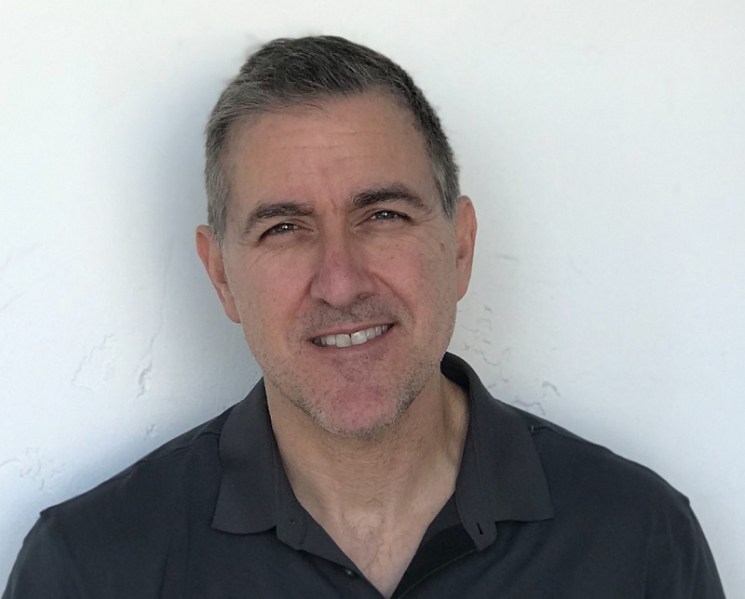
Above: Matt Karch is CEO of Saber Interactive.
GamesBeat: I was just checking out IGN’s headline about the World War Z game. It says “looks surprisingly good.” I guess that’s where we are with zombie games these days. There’s a certain amount of snark to it. What would you say about where we are with these kinds of games?
Matthew Karch: I think that the “surprisingly good” comment might also come from the fact that it’s based on a license. There’s always skepticism that a developer is going to cash in on a license and do a subpar game as a result. We certainly haven’t approached it that way. We looked at this game as an opportunity.
We’re not releasing with a film. We’re releasing independently. The model we looked at, if you remember the Chronicles of Riddick game back in the day, that was quite good and it was totally unrelated to the film. It didn’t release with the film. It needed to stand on its own. We’ve taken that approach from the start.
We’re an independent developer, right? We’re fairly large for an independent, with about 450 developers in our two primary core studios, but we still don’t have the budgets of an EA or an Activision to go out there and market a new title, a new brand, and bring awareness of something that doesn’t already have recognizable staying power. From our perspective, grabbing a license, especially one that fits the game we wanted to create, was the perfect way to get that awareness without having to spend tens of millions of dollars to make our potential audience aware of the franchise.
The flip side, though, is there is the skepticism about licenses. And I agree that there’s probably also a skepticism about zombie games. But this is a different type of zombie game. In the novel they don’t even call them zombies. They call them Zs. They’re obviously zombies, but they move differently and act differently than in almost every other game. It’s its own thing.
We’re huge fans of Left 4 Dead, and I think that comes across in some of our videos. We wanted to create an experience which mirrored that experience, or maybe the best way to put it — that was inspired by that. We didn’t see any more Left 4 Deads in the pipeline. We thought this was an opportunity to create an experience we loved that would kind of be an evolution of that. That’s a long-winded intro, but I hope I answered your question.
https://www.youtube.com/watch?time_continue=1&v=TKFP3pzoeuk
GamesBeat: How much time have you put into this so far? How did it all get started?
Karch: It’s actually been three years of development. We wrapped up on one of the Halo projects we were working on. We had a team available and we were looking for the next thing to do. This was prior to us starting to work on Quake Champions. We had an opportunity — there’s a guy who at the time was handling licensing for games at Paramount. We reached out to him and said we were interested.
I was a huge fan of the book. There was a lot of skepticism about the movie, which I think was unfounded. Admittedly it’s not like the book, but it’s a great experience in its own right. I think it stands on its own. But the movie had, at the time, been getting some bad pre-release buzz, I guess you could say. But we thought that in our case, we wanted to explore it. They took us in and let us see the movie early. I’m not Siskel or Ebert but I liked it. I felt like it was going to do well, and so we made a decision to grab the license, because we wanted to make an experience that matched with what the movie had on offer.
We had a small team on it initially. Over the last three years the team size has grown significantly. We’ve had well over 100 people working on the game for a long while now. Every time we showed it to somebody, people got more excited, and that encouraged us to put more into it. We announced we’re launching the game with three episodes of three levels each, but we’ve decided to add a fourth episode we were going to release as DLC and include that as part of the package. We want to create as big a bang out of the box as possible, because we think this game is really good.
The game is a combination of the book and the movie. They have the fast-moving zombies in the movie, while in the book they have the little vignettes of story about all the different individual characters. We’ve tried to adapt both of those. The game doesn’t feature Brad Pitt. It’s not that type of experience. It’s a fast-paced crazy co-op multiplayer, hopefully scary as hell third-person shooter.
GamesBeat: We’re in a state in the market now where there are just no guarantees. I played Earthfall, a sci-fi take on Left 4 Dead, almost down to every character and creature, and it bombed. I felt like I was one of about 10 people trying to play co-op. “Is anybody out there.” Overkill’s Walking Dead game had a pretty bad start as well. Even with a license, the market can be very treacherous.
Karch: Absolutely. My personal opinion of The Walking Dead — this is not a reflection on the developers. I’ve known them for many years and like them a lot. But a lot of games have released with The Walking Dead license. I think there was a bit of market confusion about that license. Once again, it’s a different type of experience. It’s a slow, brooding type of zombie experience. We’re looking to create something that’s fast and furious.
World War Z, you have fans of the book and fans of the movie. Sometimes there’s not a lot of crossover. We’re trying to be that crossover. We’re trying to appeal to both. I hope we succeed, but you’re absolutely right. It’s very unpredictable these days. Although I will say, in the case of a Walking Dead, when they showed it at E3 it was clear that people were down on it. You kind of get an indicator before a game releases as to how it might perform. In our case we feel a positive buzz.
We’ve worked on a lot of things. We worked on multiple Halo titles. We did Quake. We did NBA. We worked on our game TimeShift way back in the day. I’ve never seen more buzz for anything we’ve done, more hype or excitement, than we’re seeing for this product. It’s an encouraging sign. Whether it’s going to take off or not, I don’t know, but I’m definitely liking the signs.
https://www.youtube.com/watch?v=kK4ni-Dc9eI
GamesBeat: I had a similar reaction. I hadn’t heard much about it, but when I saw the trailers, I thought, “That swarm activity looks really good.” It did remind me a bit of Days Gone. You guys have been working in parallel a bit. But it made me think it must be really hard to do that swarm effect. Can you talk about your game engine and what it’s capable of?
Karch: Days Gone, it’s a single-player experience. At some point I went to Sony and said, “I’ve seen what you’re doing with Days Gone. Look what we’re doing with World War Z. Maybe we can help you with a multiplayer component.” But they were obviously too focused, and understandably, on what they needed to do to get that game out.
We were already under development when we heard about it. Of course we took a deep sigh, when you know Sony is going to be putting major marketing dollars behind a title that’s highlighting the swarms the way they were. It took a little wind out of our sails. But since then they’ve focused less on those swarm elements and more, I think, on the story aspect of their game. I don’t know if we’re in the clear, is the way to put it, but there’s a market for both games, what we’re both doing.
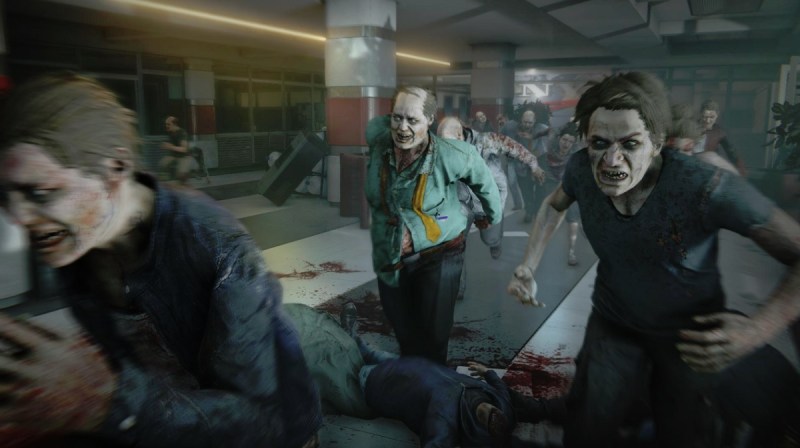
Above: Look at those teeth.
I hope that game does well. It looks fun to me. The other thing about Days Gone, people keep talking about it, but let’s not forget it’s only going to be on the PlayStation. We’re going to be on Xbox, PlayStation, and PC, and we’re multiplayer-focused. I think we complement each other well. I haven’t played their game, so I can’t tell you what it’s like, but I’ll play it when I get the chance.
As far as our engine and our tech, we’ve been working on those for — we’ve been in business for 18 years. The genesis for our engine goes back to 18 years ago, when my partner — who was a PhD in computational geometry and applied math — had his own engine, which was a student project even before that. We’ve just developed it ever since then.
People don’t know about it, but earlier iterations of this engine powered both Halo: Combat Evolved Anniversary and Halo 2 Anniversary, which was part of the Master Chief Collection. It also powered Quake Champions, which is going into Battle Pass format today. That game needed to run at 240 frames per second on literally any machine. For the most part it achieves that goal. We’ve had a strong technology base upon which to build. This and Quake were basically done in parallel.
But the biggest challenge for us was the swarms. We think this game really could only have done on our tech. Maybe on Unreal, if we had enough time and enough resources to dig deep into a third-party engine. But having a proprietary engine was critical to getting this game in a place where we felt comfortable with it. In some scenes we’ve supported 5,000 zombies on the screen at one time. It’s impractical in a real game experience, because you get overwhelmed and die in six seconds.
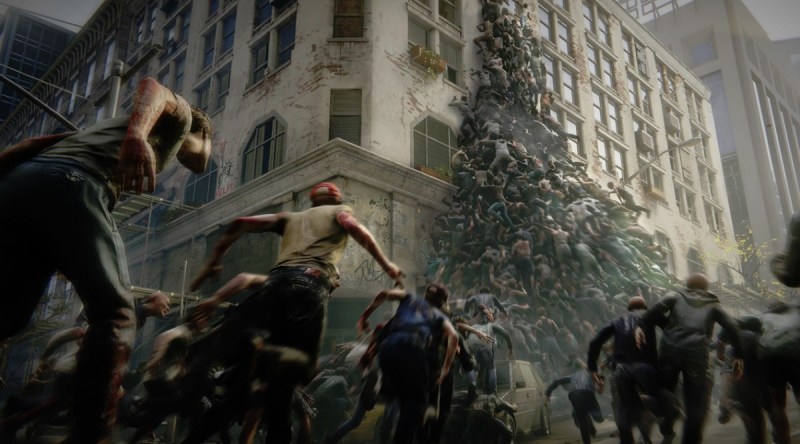
Above: World War Z’s horde.
GamesBeat: You have to balance it to make the game survivable.
Karch: Absolutely. That’s what we’ve done, I think. I don’t think the game has more — it’s scalable, right? If you’re playing with guys who are good, the game knows that, and it scales up the number of zombies. If you’re playing with guys who stink it scales down. We’re hitting somewhere between 500 and 1,000 at any given time. Even if you look at 300 on the screen it looks like so many you don’t know what to do. In the biggest battles, if there’s 400 or 500 in the scene, that’s what most people will experience, and it’s incredibly overwhelming. It’s scary as hell, especially with headphones on, because it’s going on everywhere.
We’re still doing optimizations. It’s running fast on PC. It’s running well on Xbox and PlayStation. We’re getting relatively close to wrapping up, and it’s running really well on all platforms. I don’t think we’ve announced a date yet, but it’s almost ready. We’re excited.
GamesBeat: How much do you want to enable players to take out the swarms? What does it take to make a dent when you have 500 zombies to shoot at?
Karch: The game really encourages teamwork. There are multiple ways to progress. There’s character progression and also weapon progression. We have a ton of different weapons, and obviously you have to choose the right tool for the job. Heavy projectile weapons can take 10, 20, 30 out at a time, depending on where you hit them, especially if they’re piled up in swarms. If they’re climbing up a wall you can knock down the whole pyramid. Or we have the machinegun style with a rapid rate of fire. Those are upgradable as well.
Really, our hope is that people will play each of these levels 30, 40, 50 times, because there are so many different ways to play through them. That took a ton of balancing. The characters have different classes, and those classes obviously impact progression as well. But the real key is choosing the right weapon. In areas where there are swarms, you’re better off with a rocket launcher type of weapon. Some of them are single-shot, and then you need to reload it. But the more you play, the better your arsenal becomes, and the more frantic it becomes, because as I said, the game scales up. If you get better weapons and start playing better, we’ll throw more zombies at you.
It should be a continuous cycle. That’s the hope. We’re doing some testing right now and it’s panning out. We’re excited about that.
GamesBeat: I’m sure you’ll get hit with people saying, “Oh, it’s a Left 4 Dead clone.” How are you trying to innovate so people don’t have that impression?
Karch: Some things are unavoidable. The good news for us, although it’s bad news for fans, is that there’s no Left 4 Dead 3 on the horizon as far as I’m aware. We were obviously very heavily inspired by it. We think we’re going to fill a niche here. We think we’ll give gamers what they want. Yes, this game is similar than Left 4 Dead, but we have many more zombies on the screen, and they move a lot faster. Even though the core experience is similar, the swarms and the numbers and the fact that it’s less tongue-in-cheek, more scary and more frantic, that will differentiate it.
If people come and give us those comparisons, well, that’s already a good sign. If we can get to the point where people are comparing us a game that’s sold more than 20 million copies or whatever it is, great. We’ll take it. [laughs]
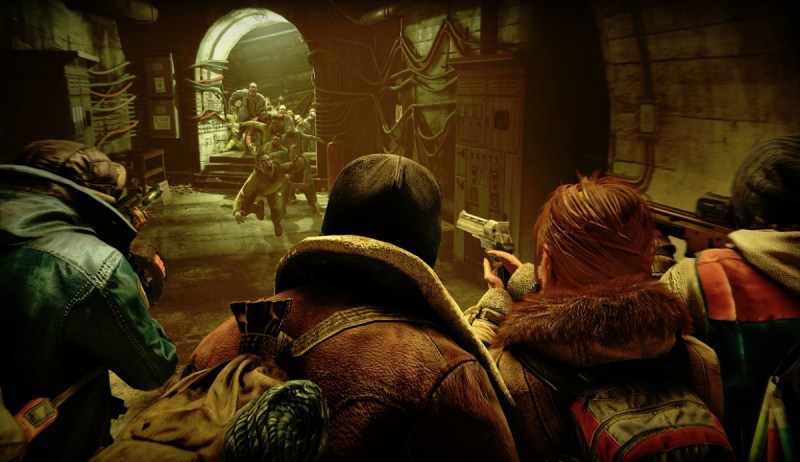
Above: World War Z is coming in 2019.
GamesBeat: On the story side, did you feel like you had to invest in that? Was some of that already there through the fiction?
Karch: Other than the universe, which is a post-apocalyptic type of world, we didn’t take much from the film. We took the design of the zombies, the way they move, and we took the realistic current-day setting. After that, we had the freedom to innovate.
The way our game works, it’s not a linear story. Each episode tells its own story, in the way that the book would tell stories, diary entries, about survivors in different parts of the world. Each level tells a story. The story is relatively simply told, because the focus is on the action. But we’ve certainly invested in creating mini-universes within the larger World War Z universe. As we continue to develop them, they’ll start to intersect with each other in interesting ways.
There certainly is a story component, but we don’t expect people are going to be coming into World War Z to be engrossed in a deep story. The story is more of a motivation for getting to the shooting. That’s the way we approached the game, because it makes sense for a four-player online co-op shooter to skip the expensive cinematics and focus on the mayhem.
GamesBeat: You know what you’re making.
Karch: Absolutely. You can only do a certain amount of things well. If you try to everything well you end up with everything average.
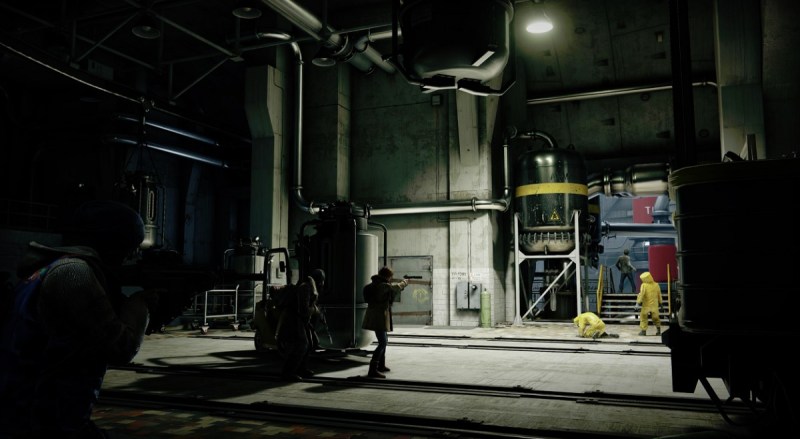
Above: A calmer moment in World War Z.
GamesBeat: Are there ways to lay traps for the zombies or hold them back for a while?
Karch: One of the conventions in the game, actually, is we have these scenes where you know a swarm is coming. You hear them in the distance. The game tells you they’re coming. Then you have to run around and scavenge and lay mines and barbed wire, set up turrets and fortify your defenses for what amounts to a big tower defense scene. We’ve definitely done that. It adds an element of strategy.
Every time you play it, the supplies are in different places. It’s kind of freaky, because you’re running around with two minutes left and you’re looking for barbed wire. It gives you a bit of a boost, but eventually they’ll get through that as well. We certainly added those elements to the game, because we wanted to give people more to do than simply shoot.
What we learned while we were working on the Halo games was, you do a few things and you do them really well. Halo’s shooting loop was one of the best ever. I don’t remember the exact quote, but there were 60-minute loops where you kept doing the same thing, and it was just fun. That’s our philosophy. Let’s create a really fun experience and do what we do well, not try to bite off more than we can chew. The three elements we have are the co-op, the shooting, and the strategic elements of trying to stay as fortified as possible. That’s how I’d break it down.
GamesBeat: What kind of feedback and reactions have you heard and incorporated?
Karch: A lot of the reaction has been — there’s a polarized community, book versus film. We saw that and we’ve taken it into account as much as we can by incorporating more of the book elements into it. As a bonus, we have the Lobo from the book, which is short for “lobotomizer,” a special kind of melee weapon we’re releasing. That’s going to be a bonus item for pre-orders. We have other story elements that we’ve borrowed from the book as well. Just the way we approach the telling of our story is book-oriented.
As far as gameplay, it’s been more about — people look at our videos and complain about how the animations don’t look final. We’re fixing that anyway, but we obviously take that feedback seriously and comb through those forums and try to find common themes that we can work on. I think we’ve done a good job so far. The way games are developed so far, it’s very much collaborative with the audience, because you really can respond to the feedback you get from things like trailers. We’ve tried to do that wherever possible.

Above: World War Z’s zombies are terrifying.
GamesBeat: What’s on the road map or the to-do list going forward?
Karch: We’re wrapping up. We’re going into polish mode. Obviously we’re going to try to get a beta out the door so we can get a small number of people playing and make sure the network code is as solid as we hope it is. We’re going to continue to iterate and develop until the day we ship. That’s the way games are made now. You put a version in a box and then you keep working, so you have that day one title update to make the game as perfect as it can be. But you need that lead time.
The team is super excited about it. Internally at Saber I’ve been fighting to be on this project, because everyone can smell a winner, I think. Everyone wants to be part of it. It’s a fun to play. We have a big enough studio to have tons of internal play sessions and people are really enjoying it.
GamesBeat: You’re exclusive to the Epic store on PC. What was appealing about that for you?
Karch: First of all, a general statement about Epic — Epic is a developer first and foremost. They’ve always been a developer. They’re one of the companies that Saber has aspired to be since we founded the company 18 years ago. In spite of, or maybe thanks to their tremendous success with Fortnite, they continue to be developer-centric, which I love about these guys.
The Epic game store is an incredibly powerful and disruptive force. Everyone, across the board, is charging 30 percent, and here comes Epic charging 12 percent. In fairness, Epic doesn’t quite have feature parity with Steam at the moment, which we didn’t need. But I believe they’ll have that in time, and it’s already having an impact. Epic is already forcing its more established competitors to rethink what they charge to developers for the services they provide.
In terms of us in particular, a partnership with Epic is just a smart move for us. It gives us tremendous viability. The platform may have less users overall, but it gives us access to the Fortnite fanbase and their influencers. It enables us to get in on the ground floor of something that has the potential to be huge.
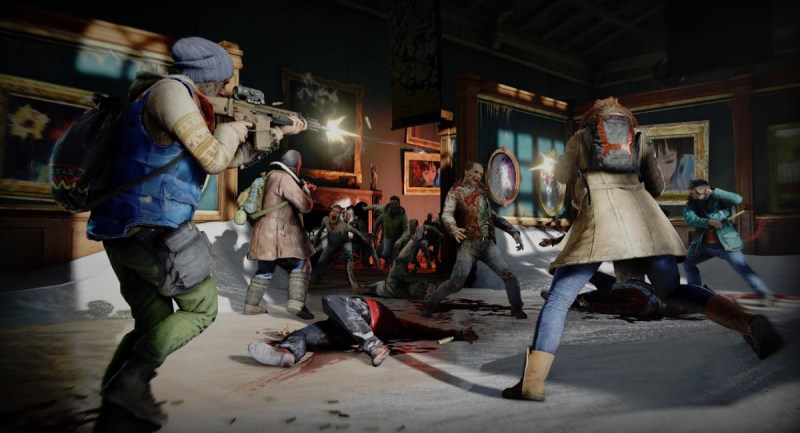
Above: World War Z pits players against more than 500 zombies in a swarm.
The difference between being on the Epic platform and being, say, a launch title on a new console is that, when you’re a launch title on a console, you have a very limited audience. You get the early adopters. In the case of the Epic store, we’re getting in on a new platform, but it’s on the PC. Everybody already has a PC. It’s just another avenue. We get the advantage in visibility of being on the new platform, but we also enjoy the benefits of having, what, 150 million people? I don’t know how many players Fortnite is up to at this point. They can’t even keep track.
We get that, and we get visibility of being a high profile title from one of the hottest game companies in the world right now. We see it as a positive. Are we going to lose out on some sales from people only want to be on Steam? Absolutely. We’ll lose some of that. But ultimately I think the trade-off for us is we’ll have a dedicated fanbase. We’ll be part of a smaller number of higher-profile, highly curated titles on a platform that has the potential to match Steam at some point in the future.
It’s a long answer, but the decision weighed heavily on us. We thought it was the right decision for us, for our company. We love the guys at Epic and we love the way they’re approaching things. We want to be part of something we consider to be disruptive in a positive way.

